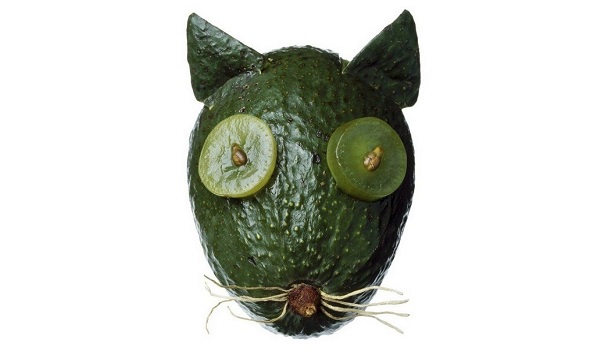Main Name: Avocado
Biological Name: Persea Americana
Names in Other Languages: Abacate (Portugese), Avocat (French), Abukado (Filipino), Avokádo (Czech), Makhanphal (Hindi), Vennai Pazham (Tamil), Alpukat (Marathi), Mager Nashpati (Urdu), Benne Hannu (Kannada)
Biological Name: Persea Americana
Names in Other Languages: Abacate (Portugese), Avocat (French), Abukado (Filipino), Avokádo (Czech), Makhanphal (Hindi), Vennai Pazham (Tamil), Alpukat (Marathi), Mager Nashpati (Urdu), Benne Hannu (Kannada)
The existence of avocado dates back to 10,000 BC, while its cultivation occurred in parts of central and southern America. This fruit reached Indonesia in 1750, Brazil in 1809, Levant in 1908 and then finally to India, where it was grown for the first time in the royal gardens of the famous Muslim ruler, Tipu Sultan. Also known as avocado pear or alligator pear, the fruit comes with a biological name of Persea Americana. It is among the most nutritive fruits that is rich in proteins and fat but low in carbohydrates. Even then, it has the highest energy value compared to other fruits, not to forget its richness in vitamins and minerals. Although the avocado is not as popular as mangoes, oranges or apples, there are a niche group of people who enjoy this delicacy. It has health benefits such as preventing cancerous formations, reducing cholesterol levels and heart diseases and several others. It must be noted that apart from consuming it naturally, avocados are widely available as sandwich fillings, salads, ice creams and milk shakes. Go through the following section to know more about it.
History
Avocado was introduced to India somewhere during the period between 1906 and 1914, when an American missionary residing in Bangalore was on a visit to Ceylon, Srilanka. In the royal botanical gardens, he spotted a tree that belonged to his home country. The missionary was fascinated with what he saw and procured a few seedlings and brought them back to Bangalore where he planted them in the Lal Bagh Gardens: the Royal gardens of the famous Muslim ruler of the Mysore state, Tipu Sultan. This is how the avocado fruit came to India. A few different varieties of it are now grown in India, although on a very limited scale, in states of Karnataka, Maharashtra, Tamil Nadu and the east Himalayan state of Sikkim.
Avocado was introduced to India somewhere during the period between 1906 and 1914, when an American missionary residing in Bangalore was on a visit to Ceylon, Srilanka. In the royal botanical gardens, he spotted a tree that belonged to his home country. The missionary was fascinated with what he saw and procured a few seedlings and brought them back to Bangalore where he planted them in the Lal Bagh Gardens: the Royal gardens of the famous Muslim ruler of the Mysore state, Tipu Sultan. This is how the avocado fruit came to India. A few different varieties of it are now grown in India, although on a very limited scale, in states of Karnataka, Maharashtra, Tamil Nadu and the east Himalayan state of Sikkim.

http://www.radicalpossibility.com/2013/07/a-good-fit.html
Health Benefits of Avocado
- Avocados have been shown to inhibit the growth of prostate cancer cells. Research has shown that certain compounds present in these fruits destroy malignant cells without harming the healthy ones. The oleic acid content in avocado has been shown to prevent the risk of breast cancer.
- Avocados have the presence of the carotenoid called lutein more than any other commonly consumed fruit. The lutien protects against macular degeneration and cataracts, two age-related eye diseases.
- Beta-sitosterol, a compound that has been shown to lower cholesterol levels, is found in high proportions in avocados.
- Folate, vitamin E, monounsaturated fats and glutathione in avocado are great for reducing the risk of heart attacks and strokes. Studies reveal that people who consume this fruit have a much lower incidence of any cardiac problems.
- Certain nutrients are absorbed better when eaten with avocado. In a survey, when participants ate salads containing avocados, they absorbed five times the amount of carotenoids (a group of nutrients comprising of lycopene and beta carotene) than those who didn’t include avocados in their meal.
- Glutathione, which is an important antioxidant, helps in preventing ageing, cancers and heart diseases. Avocados are an excellent source of this antioxidant.
- Vitamin E is an indispensable vitamin as it maintains overall health of the body and its immune system. Avocados contain a high amount of this vitamin.
- Rich in potassium, avocados can regulate blood pressure. Therefore, a diet rich in this fruit would combat any diseases of the circulatory system such as high blood pressure, heart diseases or strokes.
Avocado Nutrition FactsAmount: 1 AvocadoTotal Weight: 214 g
| Nutrients | Amount |
| Basic Components | |
| Proteins | 4.4 g |
| Calories | |
| Total Calories | 318 |
| Calories From Fats | 239 |
| Calories From Carbohydrates | 64 |
| Calories From Proteins | 15 |
| Carbohydrates | |
| Total Carbohydrates | 18 g |
| Dietary Fiber | 14 g |
| Sugar | 2.4 g |
| Starch | 235 mg |
| Fats & Fatty Acids | |
| Total Fat | 29 g |
| Saturated Fat | 4.4 g |
| Monounsaturated Fat | 18 g |
| Polyunsaturated Fat | 3.8 g |
| Omega-3 Fatty Acids | 246 mg |
| Omega-6 Fatty Acids | 3.5 g |
| Vitamins | |
| Vitamin A | 308 IU |
| Vitamin C | 26 mg |
| Vitamin E | 4.8 mg |
| Vitamin K | 45 mcg |
| Vitamin B6 | 443 mcg |
| Thiamin | 116 mcg |
| Riboflavin | 232 mcg |
| Niacin | 3.1 mg |
| Folate | 146 mcg |
| Panto Acid | 2.7 mg |
| Minerals | |
| Calcium | 25 mg |
| Iron | 947 mcg |
| Magnesium | 58 mg |
| Sodium | 12 mg |
| Potassium | 0.96 g |
| Phosphorus | 104 mg |
| Zinc | 1.2 mg |
| Copper | 478 mcg |
| Manganese | 275 mcg |
| Selenium | 0.85 mcg |
| Fluoride | 15 mcg |
How many calories in avocados (per 100 gm)Avocados have about 160 cal per 100 gm of weight
http://www.buyfruit.com.au/wurtz-avocado
How to Buy Avocados
- When selecting avocados, if you see bright green ones among purplish/maroon/blackish fruits, do not pick the former as they are haven’t ripened yet.
- Select fruits according to when you’re going to use them. If you intend to use avocados on the same day that you buy it, press to check the softness of the fruit. If you intend to use it after a few days then opt for slightly harder fruits.
- Avoid picking avocados that are blemished or have dark spots on them. If a brown nub, seen at the end of an avocado, is missing then it means that the fruit is rotting from the inside.
- The texture of avocados is extremely important. A rough skin yields more flavour as compared to the ones with smoother surfaces.
Avocado Storage Tips
- If you have bought avocados to consume within a few days, you can slow down the ripening process by storing them in a refrigerator.
- After the fruits have been cut open, place them in plastic bags and squeeze a few drops of lemon juice. Then store them at low temperatures. This will bring reduce the browning process.
- Unripe avocados can be made ripe by placing the fruits in a paper bag and keeping them at room temperature.
- If avocados are to be stored for an undetermined period of time, it can be done by putting them in an airtight container with lemon juice poured over them. This mixture is then kept in the freezer. Although this deters its consistency, the avocados will stay for almost 3-6months.



